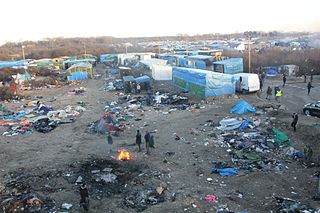Government to build "secure zone" in Calais for British-bound lorries in response to the increasing numbers of migrants
Home Secretary Theresa May announced yesterday that the Government will build a new "secure zone" in Calais for British-bound lorries in response to the increasing numbers of migrants attempting to make it to the UK via the French port, the Telegraph reported.
 In a statement to the Commons, May said the secure zone "will provide a secure waiting area for 230 vehicles – the equivalent of removing a two-and-a-half mile queue from the approaching road. This should transform protection for lorries and their drivers – removing them from the open road where they can become targets for migrants attempting to board their vehicles."
In a statement to the Commons, May said the secure zone "will provide a secure waiting area for 230 vehicles – the equivalent of removing a two-and-a-half mile queue from the approaching road. This should transform protection for lorries and their drivers – removing them from the open road where they can become targets for migrants attempting to board their vehicles."
In addition, May said that new fencing was being built to help secure approaches to the Channel Tunnel at Coquelles, where repeated incursions have taken place over the last few weeks.
May said that UK and French governments have been working closely together to respond to the pressure caused by the growing number of people migrating across the Mediterranean in recent months.
"Between 21 June and 11 July, over 8,000 attempts by illegal migrants were successfully intercepted at juxtaposed ports in France through the joint efforts of the French and British authorities," she said.
"In addition, we have made considerable progress in targeting criminal gangs in Calais through better intelligence sharing and increased collaboration between law enforcement agencies, and are running joint communications campaigns to tackle myths about life in the UK."
In her statement, May repeated that the government aim must be to "break the link between people making the treacherous journey across the Mediterranean and achieving settlement in Europe" and she said the UK was "enhancing our work with European and African partners to tackle these callous criminal gangs and increase the support for genuine refugees in their regions of origin."
Refugee Council Chief Executive Maurice Wren said last week that the UK should do more for refugees: "The refugee crisis in the Middle East and the Mediterranean presents us with one of the greatest humanitarian challenges of modern times. With peace and stability in the region a distant prospect at best, the only way to prevent desperate people making hazardous journeys is to extend a lifeline by providing alternative routes to safety."
"The UK Government must make a new, substantial pledge towards resettling thousands of refugees directly from the region and we must also make it easier for families divided by war to be able to reunite with their loved ones who are already living here in safety. For many of the world's most vulnerable people, it's quite simply a matter of life and death."